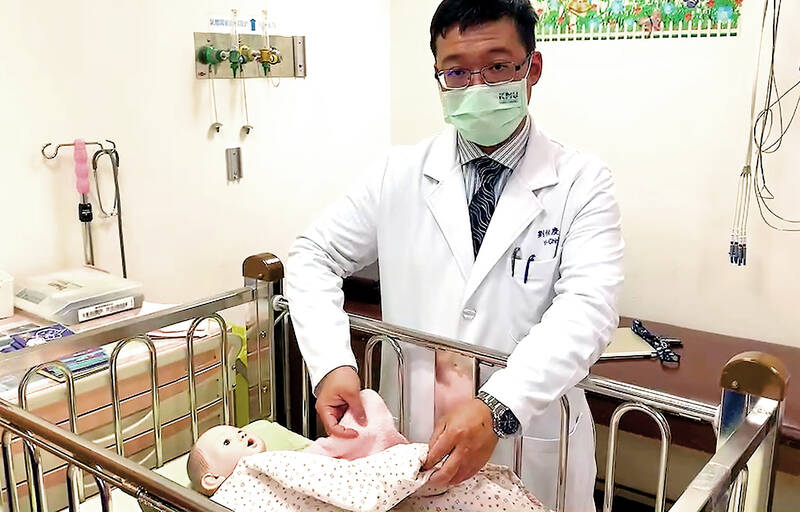Although parents might want to sleep with newborns between them to keep their babies warm in cold weather, or perhaps add pillows and heavy blankets to a crib, a pediatrician warned that this is are unsafe.
A Ministry of Health and Welfare review of the deaths of 90 children aged six and under found that 15 percent died of suffocation, such as from sleeping on their stomach, sleeping between adults or being covered by a blanket.
Many Taiwanese use pillows for infants, but newborns do not need them and can sleep comfortably lying face up and flat on their backs, Taiwan Pediatric Association secretary-general Peng Chun-chih (彭純芝) said on Sunday last week.

Photo courtesy of Chung-Ho Memorial Hospital
No matter what special features pillow brands claim to have, children under the age of one should not have a pillow, she added.
Some parents worry that their children could develop a flat head if they do not sleep on a pillow, she said.
However, babies only lie flat on their backs when sleeping, not for the whole day, so such a problem would not occur from sleep alone, Peng said.
Blankets can be placed on infants if they are light and cannot reach the child’s nose and mouth, she said.
There are safe blanket-wrapping methods that parents can learn to prevent babies from flipping or kicking off the blanket while keeping them warm.
To avoid having to wake up several times during a night to check on a baby in another room, parents can sleep in the same room as their child, but the infants should sleep in a crib that does not contain any stuffed animals or other objects, Peng said.
Parents should avoid sleeping in the same bed as their infants, as babies could be squashed or suffocate under the adults’ blanket, she said.
Parents should also avoid letting a baby sleep on its stomach against a parent’s body, Peng added.
The ministry’s child death review focused on preventable child deaths, such as parents sleeping in the same bed as their babies, which can lead to a tragedy, Peng said.
The National Health Promotion Administration said that parents need to implement safe sleeping practices for newborns, such as not allowing them to sleep on their stomach or with a pillow, while their beds should not be hot or too soft.
Parents can use sleeping bags and sleep suits for newborns, or swaddle their child in a special baby wrap, keeping their arms outside and not covering their face, the adminstration said.
Soft objects — such as pillows, blankets or stuffed animals — should not be placed in a baby’s crib, and the use of crib bumpers is also not recommended, it said.

The Coast Guard Administration (CGA) yesterday said it had deployed patrol vessels to expel a China Coast Guard ship and a Chinese fishing boat near Pratas Island (Dongsha Island, 東沙群島) in the South China Sea. The China Coast Guard vessel was 28 nautical miles (52km) northeast of Pratas at 6:15am on Thursday, approaching the island’s restricted waters, which extend 24 nautical miles from its shoreline, the CGA’s Dongsha-Nansha Branch said in a statement. The Tainan, a 2,000-tonne cutter, was deployed by the CGA to shadow the Chinese ship, which left the area at 2:39pm on Friday, the statement said. At 6:31pm on Friday,

The Chinese People’s Liberation Army Navy’s (PLAN) third aircraft carrier, the Fujian, would pose a steep challenge to Taiwan’s ability to defend itself against a full-scale invasion, a defense expert said yesterday. Institute of National Defense and Security Research analyst Chieh Chung (揭仲) made the comment hours after the PLAN confirmed the carrier recently passed through the Taiwan Strait to conduct “scientific research tests and training missions” in the South China Sea. China has two carriers in operation — the Liaoning and the Shandong — with the Fujian undergoing sea trials. Although the PLAN needs time to train the Fujian’s air wing and

The American Institute in Taiwan (AIT) put Taiwan in danger, Ma Ying-jeou Foundation director Hsiao Hsu-tsen (蕭旭岑) said yesterday, hours after the de facto US embassy said that Beijing had misinterpreted World War II-era documents to isolate Taiwan. The AIT’s comments harmed the Republic of China’s (ROC) national interests and contradicted a part of the “six assurances” stipulating that the US would not change its official position on Taiwan’s sovereignty, Hsiao said. The “six assurances,” which were given by then-US president Ronald Reagan to Taiwan in 1982, say that Washington would not set a date for ending arm sales to Taiwan, consult

A Taiwanese academic yesterday said that Chinese Ambassador to Denmark Wang Xuefeng (王雪峰) disrespected Denmark and Japan when he earlier this year allegedly asked Japan’s embassy to make Taiwan’s representatives leave an event in Copenhagen. The Danish-language Berlingske on Sunday reported the incident in an article with the headline “The emperor’s birthday ended in drama in Copenhagen: More conflict may be on the way between Denmark and China.” It said that on Feb. 26, the Japanese embassy in Denmark held an event for Japanese Emperor Naruhito’s birthday, with about 200 guests in attendance, including representatives from Taiwan. After addressing the Japanese hosts, Wang